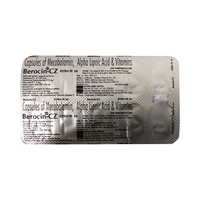Rs.164for 1 strip(s) (10 tablets each)
food interaction for Modlip-AM
alcohol interaction for Modlip-AM
pregnancy interaction for Modlip-AM
lactation interaction for Modlip-AM
food
alcohol
pregnancy
lactation
Modlip-AM Tablet may be taken with or without food, but it is better to take it at a fixed time.
None
None
CAUTION
It is unsafe to consume alcohol with Modlip-AM Tablet.
UNSAFE
Modlip-AM Tablet is highly unsafe to use during pregnancy. Seek your doctor's advice as studies on pregnant women and animals have shown significant harmful effects to the developing baby.
UNSAFE
Modlip-AM Tablet is probably safe to use during breastfeeding. Limited human data suggests that the drug does not represent any significant risk to the baby.
SAFE IF PRESCRIBED
SALT INFORMATION FOR Modlip-AM
Amlodipine(2.5mg)
Uses
Amlodipine is used in the treatment of Angina (heart-related chest pain), Hypertension (high blood pressure), Arrhythmia, hypertensive emergency, subarachnoid haemorrhage and anal fissure.
How it works
Amlodipine is a calcium channel blocker. In high blood pressure, it normalizes the blood pressure by relaxing the blood vessels to reduce the pressure on them, thereby improving the blood flow in the body. The enhanced blood flow in the body, further relaxes the heart muscles by reducing the workload on the heart. It also improves the oxygen flow in the body, thereby, preventing any heart-related chest pain.
Common side effects
Headache, Nausea, Abdominal pain, Flushing (sense of warmth in the face, ears, neck and trunk), Dizziness, Palpitations, Edema (swelling), Hypotension (low blood pressure), Chest pain, Fainting, Muscle cramp, Visual disturbance, Shortness of breath, Change in bowel habits, Weakness, Insomnia (difficulty in sleeping), Mood changes, Depression, Tremors, Taste change, Hypoesthesia (decreased sensitivity to stimuli), Paresthesia (tingling or pricking sensation), Arrhythmia (irregular heartbeats), Vomiting, Dryness in mouth, Rash, Muscle pain, Back pain, Frequent urge to urinate, Impotence, Breast enlargement in male, Decreased white blood cell count (lymphocytes), Low blood platelets, Allergic reaction, Increased glucose level in blood, Confusion, Hypertonia (increased muscle tone), Pancreatic inflammation, Gingival hyperplasia, Hepatitis (viral infection of liver), Angioedema (swelling of deeper layers of skin), Stevens-Johnson syndrome
Atorvastatin(10mg)
Uses
Atorvastatin is used in the treatment of high cholesterol and high triglycerides.
How it works
Atorvastatin is a lipid-lowering medication (statin). It works by blocking an enzyme (HMG-CoA-reductase) that is required in the body to make cholesterol. It thus lowers "bad" cholesterol (LDL) and triglycerides, raising the level of "good" cholesterol (HDL).
Common side effects
Increased glucose level in blood, Indigestion, Diarrhea, Fever, Increased creatine phosphokinase (CPK) level in blood, Joint pain, Nasopharyngitis (inflammation of the throat and nasal passages), Nausea, Pain in extremities, Urinary tract infection, Abnormal liver function tests, General discomfort, Hepatitis (viral infection of liver), Muscle damage, Rhabdomyolysis, Immune-mediated necrotizing myopathy
SUBSTITUTES FOR Modlip-AM
6 Substitutes
6 Substitutes
Sorted By
 Rs. 82.40save 51% more per Tablet
Rs. 82.40save 51% more per Tablet Rs. 65.90save 61% more per Tablet
Rs. 65.90save 61% more per Tablet Rs. 86.40save 49% more per Tablet
Rs. 86.40save 49% more per Tablet Rs. 50.01save 70% more per Tablet
Rs. 50.01save 70% more per Tablet Rs. 58.41save 65% more per Tablet
Rs. 58.41save 65% more per Tablet
Expert advice FOR Modlip-AM
- You have been prescribed Amlodipine to improve your blood pressure and/or to reduce the number and severity of angina attacks.
- Lowering blood pressure reduces the chance of future heart attack and stroke.
- Take it at the same time every day to help you remember to take it.
- A sudden drop in your blood pressure may occur, especially when you first start taking Amlodipine. To lower the chance of feeling dizzy or passing out, rise slowly if you have been sitting or lying down.
- It can cause ankle or foot swelling. To reduce the swelling, raise your legs while you are sitting down. Talk to your doctor if it does not go away.
- It may cause dizziness. Do not drive or perform any activity that requires mental focus until you know how Amlodipine affects you.
- Inform your doctor if you are pregnant, planning a pregnancy or breastfeeding.
- You have been prescribed Amlodipine to improve your blood pressure and/or to reduce the number and severity of angina attacks.
- Lowering blood pressure reduces the chance of future heart attack and stroke.
- Take it at the same time every day to help you remember to take it.
- A sudden drop in your blood pressure may occur, especially when you first start taking Amlodipine. To lower the chance of feeling dizzy or passing out, rise slowly if you have been sitting or lying down.
- It can cause ankle or foot swelling. To reduce the swelling, raise your legs while you are sitting down. Talk to your doctor if it does not go away.
- It may cause dizziness. Do not drive or perform any activity that requires mental focus until you know how Amlodipine affects you.
- Inform your doctor if you are pregnant, planning a pregnancy or breastfeeding.
Frequently asked questions FOR Modlip-AM
Amlodipine
Q. How long does it take for Amlodipine to work?
Amlodipine starts working on the day it is taken. However, it may take weeks to see the full effect. You should continue taking the medicine even if you feel better or if you do not notice any considerable difference. Consult your doctor if you have any concerns or you feel worse after taking the medicine.
Q. Does Amlodipine cause itching?
Amlodipine may cause itching in some patients, though it is an uncommon side effect. However, if you experience severe itching contact your doctor.
Q. Is Amlodipine bad for the kidneys?
No, there is no evidence that Amlodipine causes deterioration of kidney problems. Amlodipine can be used in normal doses in patients with kidney problems. In fact, its blood pressure-lowering effect, it helps to prevent injury to the kidneys due to hypertension.
Atorvastatin
Q. What should I know about high cholesterol?
Cholesterol is a type of fat present in your blood. Total cholesterol is determined by the total amount of LDL and HDL cholesterol in the body. LDL cholesterol is called “bad” cholesterol. Bad cholesterol can build up in the wall of your blood vessels and slow or obstruct blood flow to your heart, brain, and other organs. This can cause heart disease and stroke. HDL cholesterol is called “good” cholesterol as it prevents the bad cholesterol from building up in the blood vessels. High levels of triglycerides are also harmful to you.
Q. Is Atorvastatin used for lowering cholesterol?
Atorvastatin belongs to a group of medicines known as statins, which lowers the level of lipids or fats. Atorvastatin is used to lower lipids known as cholesterol and triglycerides in the blood when a low-fat diet and lifestyle changes fail to lower the levels of cholesterol and triglycerides. If you are at an increased risk of heart disease, Atorvastatin can also be used to reduce such risk even if your cholesterol levels are normal. You should maintain a standard cholesterol-lowering diet during treatment.
Q. Will taking Atorvastatin lead to an increase in my risk of diabetes?
If you are at high risk of developing type 2 diabetes, taking Atorvastatin may increase this risk slightly. This is because Atorvastatin can raise your blood sugar a little. If you already have type 2 diabetes, your doctor may advise monitoring your blood sugar levels more closely for the first few months. Tell your doctor if you find it harder to control your blood sugar.






















